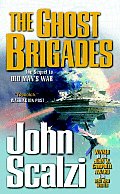
| Series: | Old Man's War #2 |
| Publisher: | Tor |
| Copyright: | March 2006 |
| Printing: | May 2007 |
| ISBN: | 0-7653-5406-3 |
| Format: | Mass market |
| Pages: | 347 |
The Ghost Brigades is a sequel to Old Man's War and even carries over a character (Jane Sagan), but it reintroduces Scalzi's world from a different angle and is suficiently unrelated to Old Man's War that it works successfully as a stand-alone novel. (It had been a bit since I'd read Old Man's War, and I didn't even realize at first that it had common character.) Some of the context of the ending makes more sense having read the previous book, but Old Man's War didn't get sufficiently into the politics of the universe to be important as background.
Scalzi stays somewhat within Starship Troopers territory with The Ghost Brigades, following yet another new soldier through the process of training and then his first combat missions. The soldier is Special Forces rather than the recruit of Old Man's War, allowing Scalzi to provide more details on the Special Forces world that he showed at the end of the previous book, but the pattern mostly matches. But this time, that's only half the story; on top of that theme, Scalzi layers a bit of a mystery, parts of the classic amnesia plot, deeper questions of identity and loyalty, and the beginnings of real politics.
The Colonial Defense Forces have discovered an unexpected alliance of several alien races who previously were at each other's throats over colonization, just like everyone else in this region of the galaxy. A human scientist named Charles Boutin appears to be in the middle of this, a traitor to the human race, but they don't know where he is or what he's doing. However, he left behind his brain image, which is enough to create a Special Forces soldier based on him and implant his consciousness. It's this soldier, Jared Dirac, who goes through the motions of normal life in Special Forces, all the time being closely monitored for what memories he might be able to tap into.
I had trouble with the first part of The Ghost Brigades, partly because I'd forgotten that I'd seen Jane Sagan before and was having trouble working out which characters I was supposed to focus on. Scalzi's writing is also plain, prone to uninspired dialogue and matter-of-fact descriptions of actions. The dialogue one gets used to, or it gets better, but apart from the occasional nice turn of phrase, Scalzi isn't going to win prizes for the quality of his prose. Until the story got started enough to hook me, I found this book bland.
The story, though, does pick up. Scalzi does a great job for most of the book turning notions of hero and villain on their head. Jared is already in an odd position, as a soldier with the mind of a traitor, but then Scalzi introduces politics that make it clear that the sides are not as clear-cut as they might appear. It's a necessary (and foreshadowed) addition to the universe and one that makes it far more interesting to me. Many things the CDF does are creepy and disturbing, and it's good to see plot acknowledgement of that and more steps towards addressing the darkness that lurks under the Starship Troopers concept.
That said, the ending is a mixed bag, and some of what's good about the rest of the story falls apart there. Scalzi works his way up to some profound political and moral conflict and a possibility of creating a true no-villain story and then doesn't go there in ways that I found disappointing. The personal and identity dynamics of Jared's story mostly work (after some frustrating bits); the political and moral decisions were too simple and left me unsatisfied. It mostly doesn't matter, since the story is more about Jared's personal struggles than it is about the political backdrop, but a more difficult treatment of the politics would have kicked the book up a notch for me.
Despite a rocky start and uninspiring writing mechanics, The Ghost Brigades was entertaining and surprisingly suspenseful reading. I wouldn't call it great writing, but it still grabbed me enough to finish it in an afternoon. It's better and more complex than the first book of the series (although less funny), and while I'd still rate it as mostly fluffy mil-SF, it's moving into the thoughtful end of that classification. It's probably still not interesting to those who don't like military SF, but the potential is growing.
Followed by The Last Colony.
Reviewed: 2008-05-26